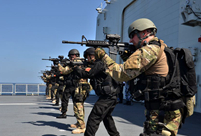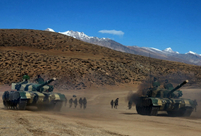 Army aviation: Adding wings to infantry
Army aviation: Adding wings to infantry
 Old photos of Chinese President Xi Jinping’s father and his families
Old photos of Chinese President Xi Jinping’s father and his families
 Bikini show in 2014 China Final of Miss Tourism World
Bikini show in 2014 China Final of Miss Tourism World
 Close-up view of August Aerobatic Team
Close-up view of August Aerobatic Team
 Goddesses married in 2014
Goddesses married in 2014
 Polar region photos raise worldwide awareness of global warming
Polar region photos raise worldwide awareness of global warming
 Get off at the last stop — Beijing Subway in vision
Get off at the last stop — Beijing Subway in vision
 Top 100 beauties in the world!
Top 100 beauties in the world!
 Gallery: Who is the most beautiful one?
Gallery: Who is the most beautiful one?
 If you like autumn, put your hands in the air!
If you like autumn, put your hands in the air!
BEIJING, Dec. 30-- For the past year, six world powers have engaged with Iran in rounds of tough talks in a bid to strike a comprehensive agreement over Tehran's long-standing controversial nuclear program.
In November 2013, the six countries -- Britain, China, France, Germany, Russia and the United States -- and Iran clinched an interim agreement in Geneva, whereby Iran agreed to cap its nuclear program in exchange for limited sanction relief.
However, the deadline for following negotiations has been extended twice this year, yet with no major breakthroughs.
As an important negotiating party, China has always had an objective, fair and responsible attitude toward the Iranian nuclear issue, and has played a constructive role in bringing suggestions to the talks.
DIALOGUE IS THE ONLY WAY OUT
As a permanent member of the UN Security Council and a party to the Iranian nuclear talks, China has always maintained an objective, impartial and responsible position, actively promoted peaceful talks, and played a significant role in advancing the dialogue process.
China welcomed the agreement reached last month, hailing it as a significant first step in the process of the diplomatic settlement of the Iranian nuclear issue.
The deal has once again proved that dialogue and negotiation are the only viable approach to properly resolve the Iranian nuclear issue, and is in line with the common interests of all parties.
In the meantime, China opposes Iran's attempts to develop nuclear weapons and support the establishment of a zone free of weapons of mass destruction in the Middle East.
China hopes that all parties will implement the agreement properly, maintain a good momentum of dialogue and negotiation, and make progress toward a comprehensive, long-term settlement of the Iranian nuclear issue.
"What matters now is to properly implement the agreement," said Chinese Foreign Minister Wang Yi, stressing that it is imperative to lose no time in pushing ahead with the negotiations in order to reach a final agreement that provides a comprehensive and once-for-all solution.
CREATIVITY URGED IN NUCLEAR TALKS
Significant differences and long-lost trust have suggested that in the future talks, negotiators have to cope with unprecedented international and domestic pressure and to exercise political wisdom in order to deliver a comprehensive nuclear deal.
The most hard-to-crack problems that divide the negotiators are how much nuclear capability Iran can keep, and the steps to lift West-imposed sanctions against Tehran.
The Western powers want Iran to massively cut its Uranium enrichment activities, but Iran insists that it must maintain its current level to provide fuel for electricity and other peaceful purposes. Iran's supreme leader Ayatollah Ali Khamenei said that his country should have no fewer than 19,000 centrifuges, which is a "red line."
Given the differences and distrust among the negotiators, China hopes all parties can creatively seek a solution to difficult issues.
Though all parties have demonstrated the political will to reach a comprehensive agreement at an early date, China holds that they should exert more political will, courage and creativity to mull things over, move forward and meet each other half way.
"China expects all parties to work closely, seek current opportunities, show creativity and seek a package of solutions that takes all parties' concerns into consideration," Chinese Foreign Ministry spokesman Hong Lei said in October.
Accomplishments always come with a price. It is no doubt that when the negotiators meet again next year, they have to weigh the price they are willing to pay for a final deal. If they are courageous enough to make key compromises, their efforts will be surely rewarded.
 Tempting Yunnan cuisine
Tempting Yunnan cuisine Joint anti-piracy drill
Joint anti-piracy drill PLA conducts tactical drill in Tibet
PLA conducts tactical drill in Tibet Beautiful Chinese woman
Beautiful Chinese woman Chestnut girl goes viral online
Chestnut girl goes viral online Time travel photos become a hit in military academies
Time travel photos become a hit in military academies Unknown 'monster' fish caught in Shandong
Unknown 'monster' fish caught in Shandong 20 years on: Relocated Three Gorges residents through lens
20 years on: Relocated Three Gorges residents through lens PLA HK Garrison veterans leave behind beautiful smiles
PLA HK Garrison veterans leave behind beautiful smiles Making sex safe
Making sex safe Gmail glitch fuels unnecessary speculation
Gmail glitch fuels unnecessary speculation Shenzhen imposes limits on purchases of new cars
Shenzhen imposes limits on purchases of new cars A Hongkonger working with mainland media confronted by both sides in Occupy Central reporting
A Hongkonger working with mainland media confronted by both sides in Occupy Central reportingDay|Week|Month